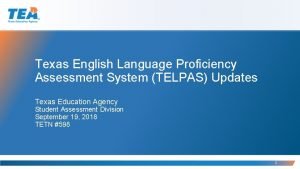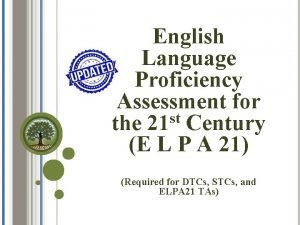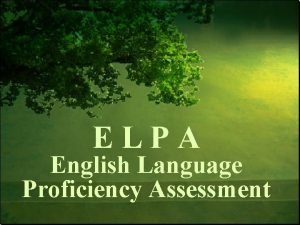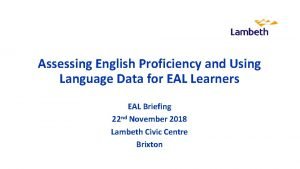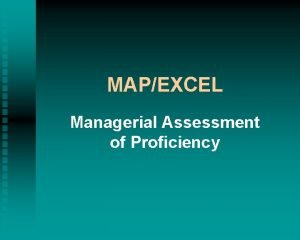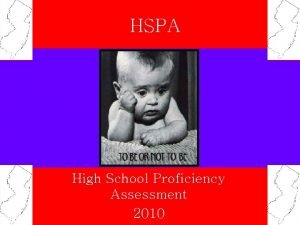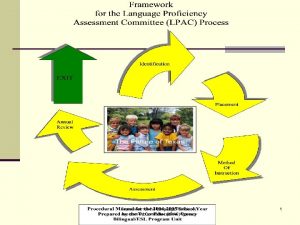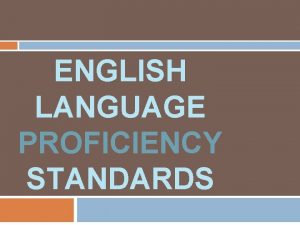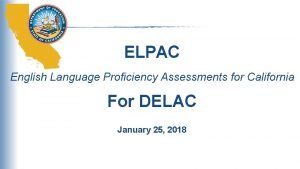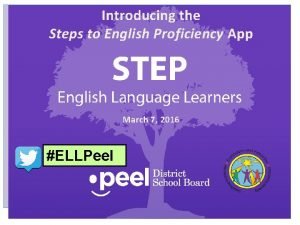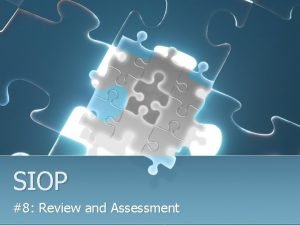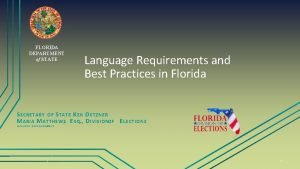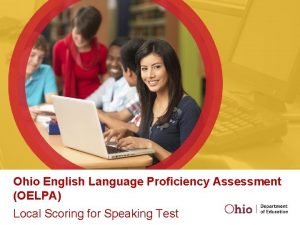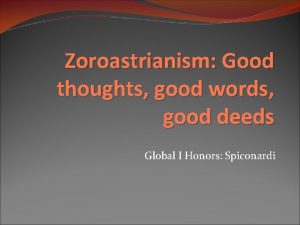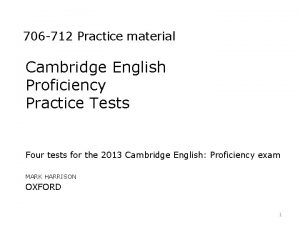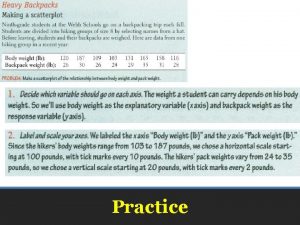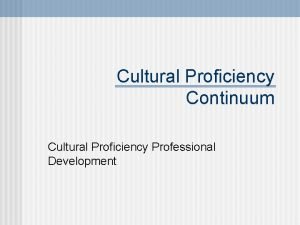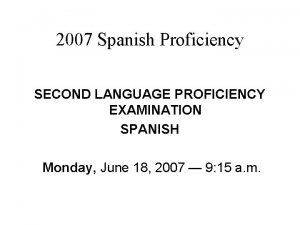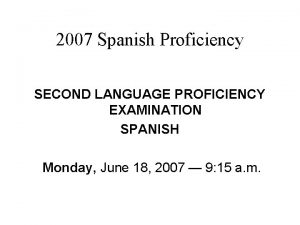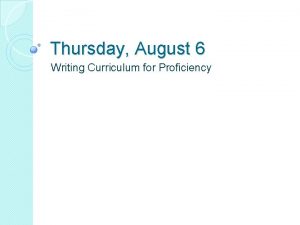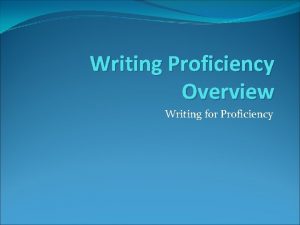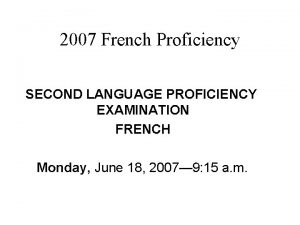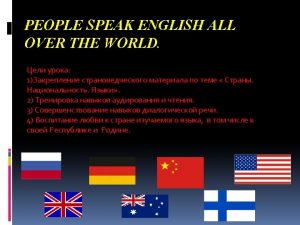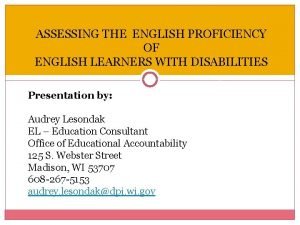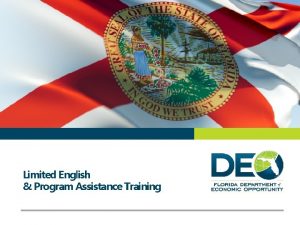Good Practice in Assessment of English Proficiency in


















- Slides: 18

Good Practice in Assessment of English Proficiency in Children with EAL Lambeth Amanda Bellsham-Revell November 22 nd 2018

When are children considered as having EAL? Df. E defn: A pupil’s first language is defined as any language other than English that a child was exposed to during early development and continues to be exposed to in the home or community. If a child was exposed to more than one language (which may include English) during early development, a language other than English should be recorded, irrespective of the child’s proficiency in English.

Possible scenarios 1. If a child speaks another language to any degree, they have EAL 2. If a child hears another language and speaks a few words but responds in English, they have EAL 3. If a child speaks only English, but they hear another language, they have EAL 4 If the child speaks only English, the household speaks only English, but one of the parents might use another language when communicating to others, then it is a judgment call depending on the impact of that language on the child’s development of English. So if it’s extremely minimal, then they do not have EAL. 5. If the parents speak different languages and communicate in English with each other and the child, they may be considered as having EAL, where the parents’ English is clearly affected by this.

Moderation 2017 Why and how? Moderated schools were chosen on the basis of one of the following: • Direct requests for support or to be moderated • Those which had not been moderated in recent years, but also may: – Show a high level of deviation from the expected proficiency levels – Have a higher number of Code N (not yet assessed) – Have more pupils whose language and English proficiency didn’t correspond Process • Random sample of 8/9 pupils with EAL selected – different year groups, languages and Stages of Proficiency. • Each pupil was assessed by moderator, outcomes compared with those recorded and discussed with staff

Moderation Outcomes • KS 3/4 - Variation in interpretations of the descriptors at stages D and E • Need to ensure Proficiency stages reflect a pupil’s EAL development and not slow progress caused by SEND. • Discrepancies revealed by a comparison between Stage of English and curricular reading and writing tests/assessment results • Standardisation anomalies caused by the difficulty in applying the descriptors to the younger pupils.

Progression across the stages • Take note of the qualifiers – some, basic, beginning, widening, occasional, mostly, • Vocabulary – – – Not just a single word! Affects reading fluency and understanding We talk about the children’s range of vocabulary but not about the depth of their vocabulary knowledge • Reading – development from decoding to reading with full understanding • Writing, considering age expectation, look for: Genre changes Cohesion and structure Inappropriate use of conjunctions ie but Limited to basic subordinators ie because, if, so Detail added to end, rather than through noun/verb phrases or movement of clauses – Over-dependent on simple or compound sentences – – –

What is Vocabulary?

Progression in vocabulary KS 1 Speaking Stage A Has very basic vocabulary relating to school and activities KS 2 Writing Stage B Has basic vocabulary but may have become familiar with some subject-specific words/phrases Stage B Is acquiring some topic/subject specific vocab but still very dependent on deictic language such as her/there/this and common verbs ie have, be, do, come, go, make Stage C Has a fairly wide vocabulary, including subjectspecific words Stage C Uses a wider range of vocabulary across the curriculum but not always appropriately: - rapid animal, slammed open - duplication – big, vast, rapidly rushed - overdependent on common verbs make, do, have, be, come, go Stage D Has a wide vocabulary and is beginning to understand that a word can have more than one meaning ie cross and can be used in different ways – cross your fingers Stage D Wide range and increasing depth of vocabulary, used appropriately, but needs support to further develop abstract vocabulary, ie envy, democracy

Acceptable/appropriate Fair play Play fair Fair price Fair question Fair on somebody Fair warning It doesn’t seem fair To be fair. . she was. . Fair result Treating people equally We have to be fair to both Fair trial It’s not fair Fair test Fair share Beauty Fair maiden Quite large Fair number Fair bit to do A fair way off Quite good Fair chance Fair bet Fair condition fair Weather Fair wind behind them Fair weather Pale in colour Fair hair Idioms Fair and square All’s fair in love and war. Fair means or foul Fair crack of the whip Fair enough Give … a fair hearing Fairs fair More than his fair share It’s a fair cop Fair game Fair to middling Fairest one of all Nouns Funfair Book fair Craft fair Fairground

Vocabulary – ‘fair’ • • • Understand it Choose when and how to use it Position in sentence Pronounce it Spell it Structure of it Changing the meaning – fair/unfair/fairest Meaning in context (multiple meanings) Collocations (words that go with it) Synonyms

Developing breadth of vocabulary • Multiple meanings – take a word for a walk • Multi-word verbs: – phrasal verbs have a verb and adverb particle ie The meaning cannot usually be guessed from individual parts. ie The plane took off. . Took his boots off – prepositional verbs have a verb and a preposition which cannot be separated ie break into, deal with – phrasal-prepositional verbs – catch up with, listen out for, face up to – often informal • Shades of meaning • Collocations

Multi-word Verbs take • • Suspended from Suspended by Suspended until Suspended over Suspended in the air Suspension suspense

Collocations flows Current Electricity A circuit Wire A switch Copper conducts opens construct connects measure

Principles for learning vocabulary Consider which words to teach – Tiers 1, 2, & 3 • Repetition and multiple encounter • Cognitive depth – manipulation of words. Activities like dictionaries, synonyms/antonyms, collocations • Affective depth – developing a relationship with words so they become memorable ie those they like in a text • Retrieval – more recalled, more memorable • Recontextualisation – speaking, listening, reading and writing in different contexts • Personalisation – used to express personal experiences • Spacing – interval between practice should increase MY English Pages

Developing understanding in reading Pupils levels of decoding are usually in advance of their understanding. • Preparation and pre-teaching • Information gap activities • Probing questions

Family tree

Issues in writing in Year 6 & KS 3/4 • Difficulty in finding and using ideas from reading in their writing • Keeping control of genre and register • Lacking detail, with simple sentence and phrase grammar to express connections. • Inaccuracies in subject-verb agreements • Choosing the right article • Choosing the correct preposition in formulaic phrases, e. g. help with • Dependency on delexical verbs (e. g. do, make, put) • Accuracy in noun-pronoun agreements and plurals

Good practice for EAL assessment • Interpret descriptors in line with age-expectations for English only peers • Note qualifiers ie some, with support, limited, widening, growing awareness, occasional, wide range • Consider the use of English across the curriculum and depth as well as breadth of language ie vocabulary • Consider extent of support/scaffolding • Best fit - a child does not need to achieve all descriptors to be at that stage. • Who is responsible for EAL assessment in your school? Who needs the information? • What does the data show and does it inform planning and teaching?
 Telpas speaking rubric
Telpas speaking rubric English language proficiency assessment (elpa)
English language proficiency assessment (elpa) English language proficiency assessment (elpa)
English language proficiency assessment (elpa) Nsa math proficiency test
Nsa math proficiency test Eal proficiency assessment
Eal proficiency assessment Managerial assessment of proficiency
Managerial assessment of proficiency High school proficiency assessment
High school proficiency assessment Lpac committee
Lpac committee Eal proficiency assessment
Eal proficiency assessment Language proficiency level
Language proficiency level Elpe tamu
Elpe tamu Elpac score levels
Elpac score levels Zaiba beg
Zaiba beg Review and assessment siop
Review and assessment siop Language english proficiency
Language english proficiency Elps texas standards
Elps texas standards Oelpa scoring guide
Oelpa scoring guide Good thought good words good deeds
Good thought good words good deeds Hi good good
Hi good good
